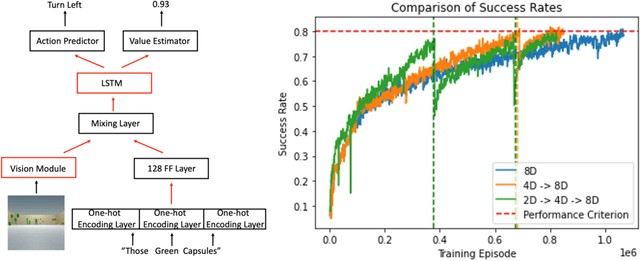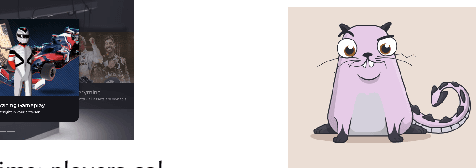Zijun Lin
FailSafe: Reasoning and Recovery from Failures in Vision-Language-Action Models
Oct 02, 2025Abstract:Recent advances in robotic manipulation have integrated low-level robotic control into Vision-Language Models (VLMs), extending them into Vision-Language-Action (VLA) models. Although state-of-the-art VLAs achieve strong performance in downstream robotic applications, supported by large-scale crowd-sourced robot training data, they still inevitably encounter failures during execution. Enabling robots to reason about and recover from unpredictable and abrupt failures remains a critical challenge. Existing robotic manipulation datasets, collected in either simulation or the real world, primarily provide only ground-truth trajectories, leaving robots unable to recover once failures occur. Moreover, the few datasets that address failure detection typically offer only textual explanations, which are difficult to utilize directly in VLA models. To address this gap, we introduce FailSafe, a novel failure generation and recovery system that automatically produces diverse failure cases paired with executable recovery actions. FailSafe can be seamlessly applied to any manipulation task in any simulator, enabling scalable creation of failure-action data. To demonstrate its effectiveness, we fine-tune LLaVa-OneVision-7B (LLaVa-OV-7B) to build FailSafe-VLM. Experimental results show that FailSafe-VLM successfully helps robotic arm detect and recover from potential failures, improving the performance of three state-of-the-art VLA models pi0-FAST, OpenVLA, OpenVLA-OFT) by up to 22.6% on average across several tasks in Maniskill. Furthermore, FailSafe-VLM could generalize across different spatial configurations, camera viewpoints, and robotic embodiments. We plan to release the FailSafe code to the community.
Human-like compositional learning of visually-grounded concepts using synthetic environments
Apr 09, 2025



Abstract:The compositional structure of language enables humans to decompose complex phrases and map them to novel visual concepts, showcasing flexible intelligence. While several algorithms exhibit compositionality, they fail to elucidate how humans learn to compose concept classes and ground visual cues through trial and error. To investigate this multi-modal learning challenge, we designed a 3D synthetic environment in which an agent learns, via reinforcement, to navigate to a target specified by a natural language instruction. These instructions comprise nouns, attributes, and critically, determiners, prepositions, or both. The vast array of word combinations heightens the compositional complexity of the visual grounding task, as navigating to a blue cube above red spheres is not rewarded when the instruction specifies navigating to "some blue cubes below the red sphere". We first demonstrate that reinforcement learning agents can ground determiner concepts to visual targets but struggle with more complex prepositional concepts. Second, we show that curriculum learning, a strategy humans employ, enhances concept learning efficiency, reducing the required training episodes by 15% in determiner environments and enabling agents to easily learn prepositional concepts. Finally, we establish that agents trained on determiner or prepositional concepts can decompose held-out test instructions and rapidly adapt their navigation policies to unseen visual object combinations. Leveraging synthetic environments, our findings demonstrate that multi-modal reinforcement learning agents can achieve compositional understanding of complex concept classes and highlight the efficacy of human-like learning strategies in improving artificial systems' learning efficiency.
FlowPlan: Zero-Shot Task Planning with LLM Flow Engineering for Robotic Instruction Following
Mar 04, 2025Abstract:Robotic instruction following tasks require seamless integration of visual perception, task planning, target localization, and motion execution. However, existing task planning methods for instruction following are either data-driven or underperform in zero-shot scenarios due to difficulties in grounding lengthy instructions into actionable plans under operational constraints. To address this, we propose FlowPlan, a structured multi-stage LLM workflow that elevates zero-shot pipeline and bridges the performance gap between zero-shot and data-driven in-context learning methods. By decomposing the planning process into modular stages--task information retrieval, language-level reasoning, symbolic-level planning, and logical evaluation--FlowPlan generates logically coherent action sequences while adhering to operational constraints and further extracts contextual guidance for precise instance-level target localization. Benchmarked on the ALFRED and validated in real-world applications, our method achieves competitive performance relative to data-driven in-context learning methods and demonstrates adaptability across diverse environments. This work advances zero-shot task planning in robotic systems without reliance on labeled data. Project website: https://instruction-following-project.github.io/.
Compositional Learning of Visually-Grounded Concepts Using Reinforcement
Sep 08, 2023



Abstract:Deep reinforcement learning agents need to be trained over millions of episodes to decently solve navigation tasks grounded to instructions. Furthermore, their ability to generalize to novel combinations of instructions is unclear. Interestingly however, children can decompose language-based instructions and navigate to the referred object, even if they have not seen the combination of queries prior. Hence, we created three 3D environments to investigate how deep RL agents learn and compose color-shape based combinatorial instructions to solve novel combinations in a spatial navigation task. First, we explore if agents can perform compositional learning, and whether they can leverage on frozen text encoders (e.g. CLIP, BERT) to learn word combinations in fewer episodes. Next, we demonstrate that when agents are pretrained on the shape or color concepts separately, they show a 20 times decrease in training episodes needed to solve unseen combinations of instructions. Lastly, we show that agents pretrained on concept and compositional learning achieve significantly higher reward when evaluated zero-shot on novel color-shape1-shape2 visual object combinations. Overall, our results highlight the foundations needed to increase an agent's proficiency in composing word groups through reinforcement learning and its ability for zero-shot generalization to new combinations.
When Creators Meet the Metaverse: A Survey on Computational Arts
Nov 26, 2021



Abstract:The metaverse, enormous virtual-physical cyberspace, has brought unprecedented opportunities for artists to blend every corner of our physical surroundings with digital creativity. This article conducts a comprehensive survey on computational arts, in which seven critical topics are relevant to the metaverse, describing novel artworks in blended virtual-physical realities. The topics first cover the building elements for the metaverse, e.g., virtual scenes and characters, auditory, textual elements. Next, several remarkable types of novel creations in the expanded horizons of metaverse cyberspace have been reflected, such as immersive arts, robotic arts, and other user-centric approaches fuelling contemporary creative outputs. Finally, we propose several research agendas: democratising computational arts, digital privacy, and safety for metaverse artists, ownership recognition for digital artworks, technological challenges, and so on. The survey also serves as introductory material for artists and metaverse technologists to begin creations in the realm of surrealistic cyberspace.
 Add to Chrome
Add to Chrome Add to Firefox
Add to Firefox Add to Edge
Add to Edge